Global warming
Regional Warming
We must consider the summer
temperature change of different regions
to assess global warming dangers.
Arctic warming
The most important region by far is the Arctic - because of all the carbon the Arctic holds, till now safely cold and frozen. In the case of the Arctic the temperature increase has not stalled- it has gone on increasing at a rapid rate. Now the Arctic is warming 3X the global average. That means increasing Arctic methane emissions, and also CO2 and nitrous oxide. This increased warming of the Arctic is what matters most because it can lead to the planetary catastrophe of GHG feedback rapid global warming and runaway climate change.
We must consider the summer
temperature change of different regions
to assess global warming dangers.
Arctic warming
The most important region by far is the Arctic - because of all the carbon the Arctic holds, till now safely cold and frozen. In the case of the Arctic the temperature increase has not stalled- it has gone on increasing at a rapid rate. Now the Arctic is warming 3X the global average. That means increasing Arctic methane emissions, and also CO2 and nitrous oxide. This increased warming of the Arctic is what matters most because it can lead to the planetary catastrophe of GHG feedback rapid global warming and runaway climate change.
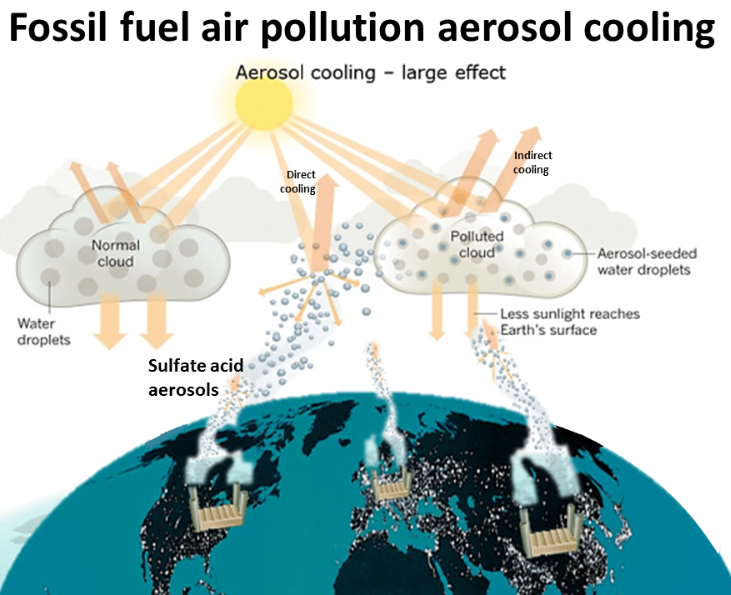
Global warming is a poor single metric.
RADIATIVE FORCING (total heat in the climate system) correlates directly with the total increase in atmospheric GHGs. The NOAA converts the two into a GHG Index which provides a measure of the increase in GHG heat in the whole climate system. It is the best single index of global climate change to use.
RADIATIVE FORCING (total heat in the climate system) correlates directly with the total increase in atmospheric GHGs. The NOAA converts the two into a GHG Index which provides a measure of the increase in GHG heat in the whole climate system. It is the best single index of global climate change to use.
Climate Emergency Institute
GLOBAL WARMING IS ACCELERATING
Global warming is the increase in global average (land-sea) (year average) surface temperature, as a consequence of radiative (heat) forcing increased caused by anthropogenic (human sourced) greenhouse emissions (IPCC)
June 1988 New York Times Global Warming Has Begun, Expert (NASA James Hansen) Tells Senate
THE BASIC SCIENCE
There was never any question in the science that emissions of greenhouse gases would cause global surface warming, increasing with the amount and duration of emissions. The very atomic structure of GHG molecules (dipole) determines that as fact. Since the first IPCC assessment in 1990 that has been certain.
IPCC 1990 Assessment
We are certain of the following:
• there is a natural greenhouse effect which already keeps the Earth warmer than it would otherwise be
• emissions resulting from human activities are substantially increasing the atmospheric concentrations of the greenhouse gases carbon dioxide, methane, chlorofluorocarbons (CFCs) and nitrous oxide These increases will enhance the greenhouse effect, resulting on average in an additional warming of the Earth's surface The main greenhouse gas, water vapour, will increase in response to global warming and further enhance it'
(IPCC 1990 1st Assessment WG1 Science Executive Summary).
Ocean heat: global warming says nothing about the >90% of GHG heat that goes to ocean warming. The heat in the oceans is a commitment to higher degrees of future global warming, even with rapid reductions of emissions.
Fossil fuel air pollution acid aerosol global cooling: Global warming is
reduced by fossil fuel air pollution acid aerosol cooling.
In recent years from air pollution management this emissions has declined boosting global warming.
This is also a commitment to increased future global warming because industrial fossil fuel emissions
have to be stopped to stabilize the climate-and ocean acidification.
Amplifying feedback emissions: global surface warming will (and is) cause additional feedback emissions from the warming planet surface. The obvious example of an amplifying feedback is the increased forest fires.
This is the single certain greatest danger of global surface warming.
There was never any question in the science that emissions of greenhouse gases would cause global surface warming, increasing with the amount and duration of emissions. The very atomic structure of GHG molecules (dipole) determines that as fact. Since the first IPCC assessment in 1990 that has been certain.
IPCC 1990 Assessment
We are certain of the following:
• there is a natural greenhouse effect which already keeps the Earth warmer than it would otherwise be
• emissions resulting from human activities are substantially increasing the atmospheric concentrations of the greenhouse gases carbon dioxide, methane, chlorofluorocarbons (CFCs) and nitrous oxide These increases will enhance the greenhouse effect, resulting on average in an additional warming of the Earth's surface The main greenhouse gas, water vapour, will increase in response to global warming and further enhance it'
(IPCC 1990 1st Assessment WG1 Science Executive Summary).
Ocean heat: global warming says nothing about the >90% of GHG heat that goes to ocean warming. The heat in the oceans is a commitment to higher degrees of future global warming, even with rapid reductions of emissions.
Fossil fuel air pollution acid aerosol global cooling: Global warming is
reduced by fossil fuel air pollution acid aerosol cooling.
In recent years from air pollution management this emissions has declined boosting global warming.
This is also a commitment to increased future global warming because industrial fossil fuel emissions
have to be stopped to stabilize the climate-and ocean acidification.
Amplifying feedback emissions: global surface warming will (and is) cause additional feedback emissions from the warming planet surface. The obvious example of an amplifying feedback is the increased forest fires.
This is the single certain greatest danger of global surface warming.

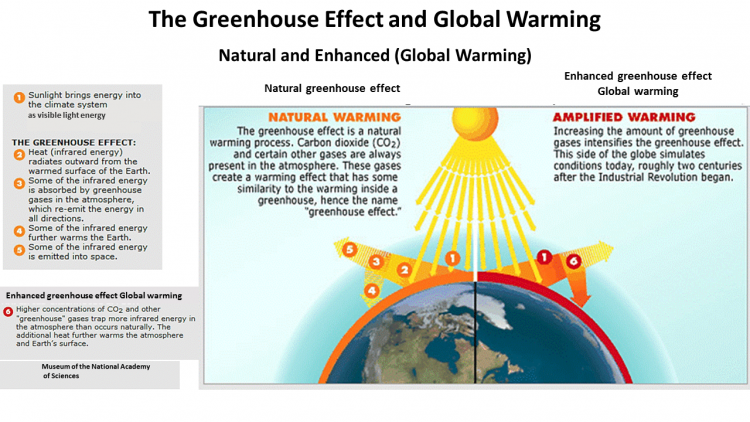
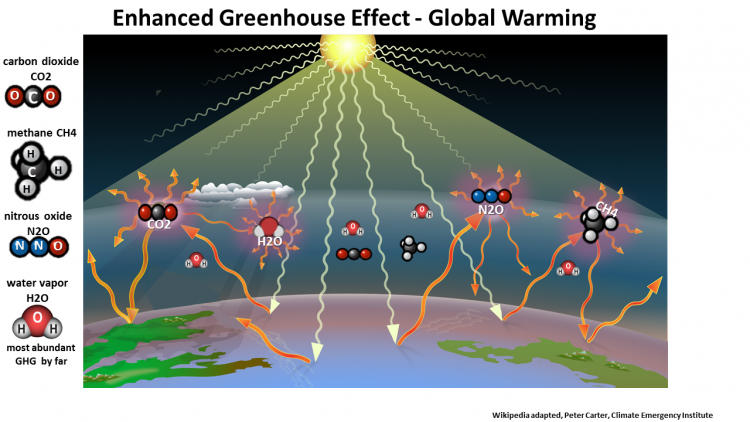
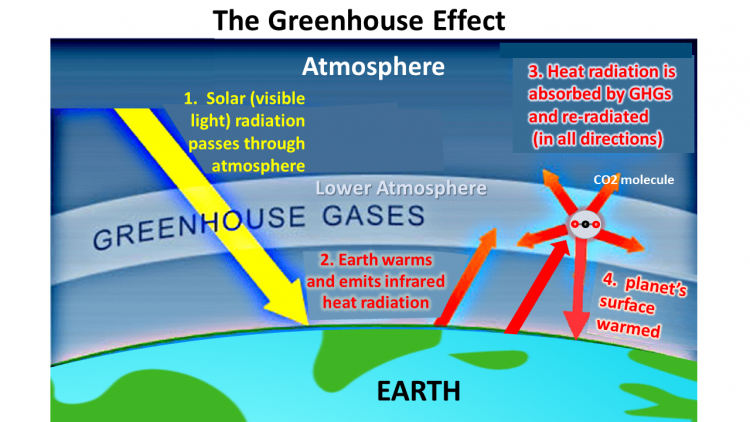
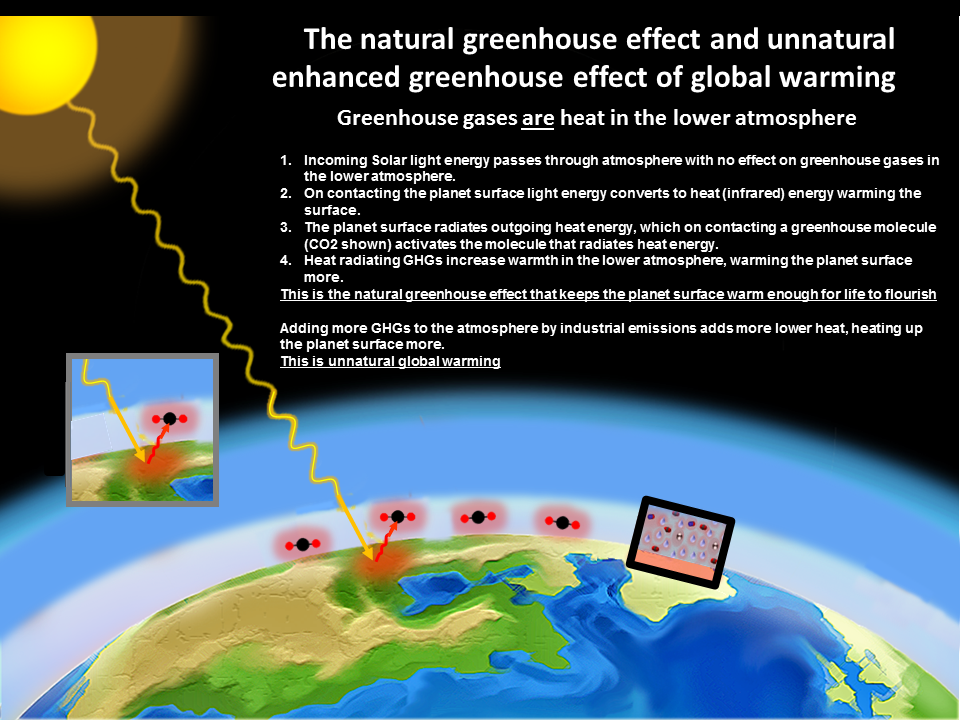
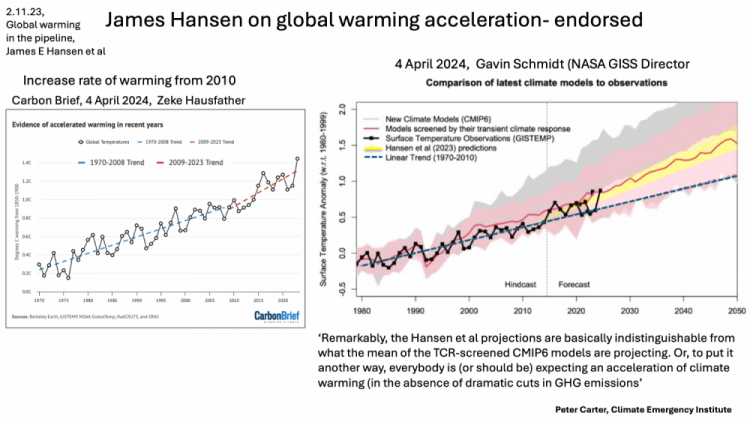
As predicted decades ago the nothern hemisphere is warming faster than the
southern (which has more ocean) and the Arctic is warming fastest of all (Arctic amplification).
Extreme rapid Arctic warming (3-4X rest of planet) is a planetary emergency because the largest sources of carbon which will be released by more with warming - are in the Arctic, like permafrost.
Rapid warming of Europe and N. America is a planetary emergency- the world's best food producing regions, where heat waves and drought are increasing.
The long term trend of global warming from 1900 is obviously an accelerating rate of increase
From 1980 warming tripled
From 2010 warming increased again
partly due to air quality management
From 1980 warming tripled
From 2010 warming increased again
partly due to air quality management
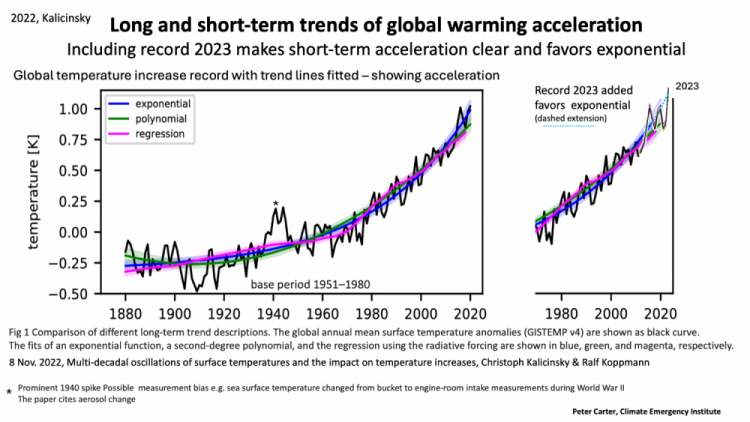
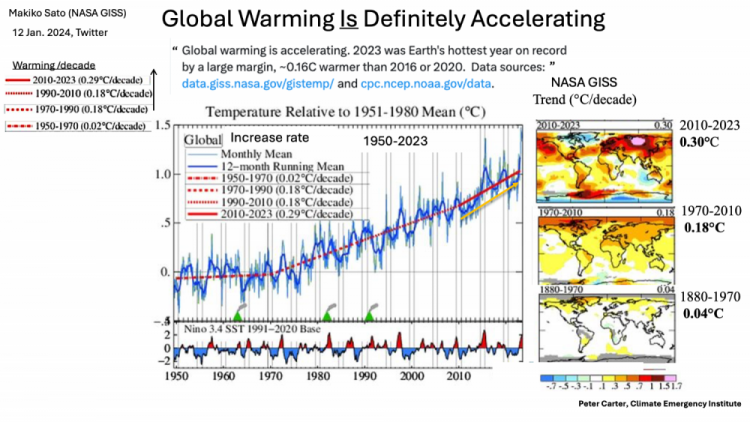
2023 warming was a big record at 1.45°C, unexpected, even though El Nino (warming) year
2024 was even higher- a record at 1.55°C, even more unexpected as a La Nina (cooling) year
2025 1.47°C (NASA, Copernicus)
Global temperatures from the past three years (2023-2025) averaged more than 1.5°C, first time (Copernicus 2025 report)
2024 was even higher- a record at 1.55°C, even more unexpected as a La Nina (cooling) year
2025 1.47°C (NASA, Copernicus)
Global temperatures from the past three years (2023-2025) averaged more than 1.5°C, first time (Copernicus 2025 report)
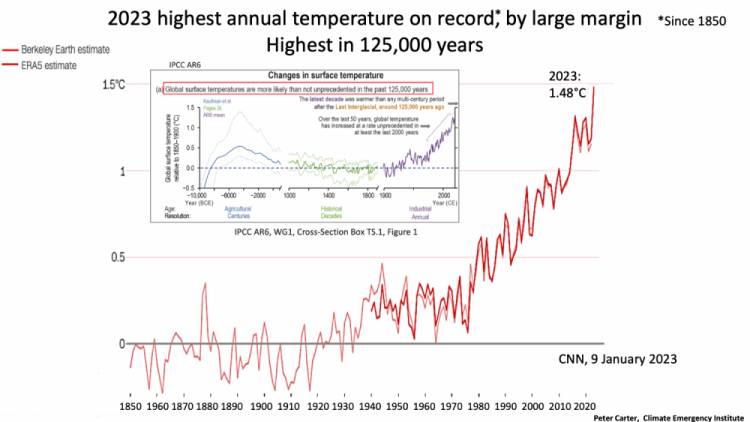
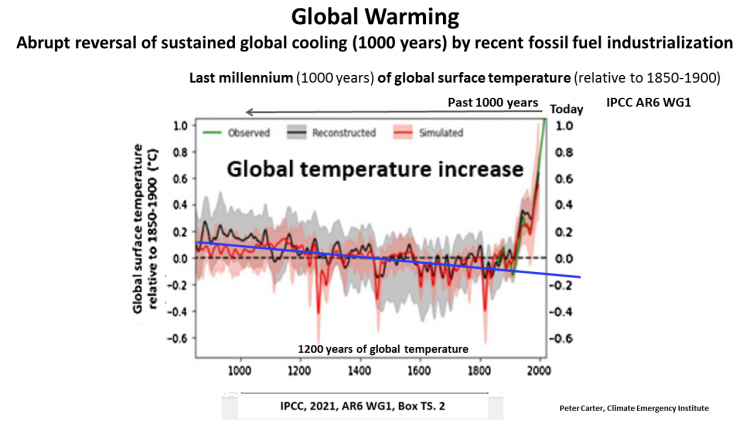
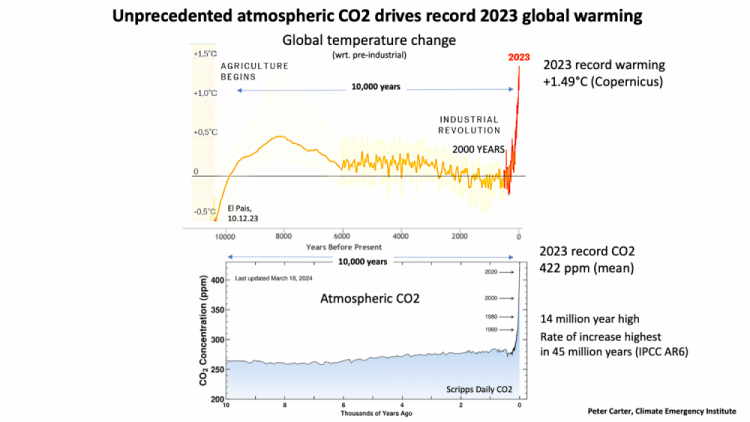
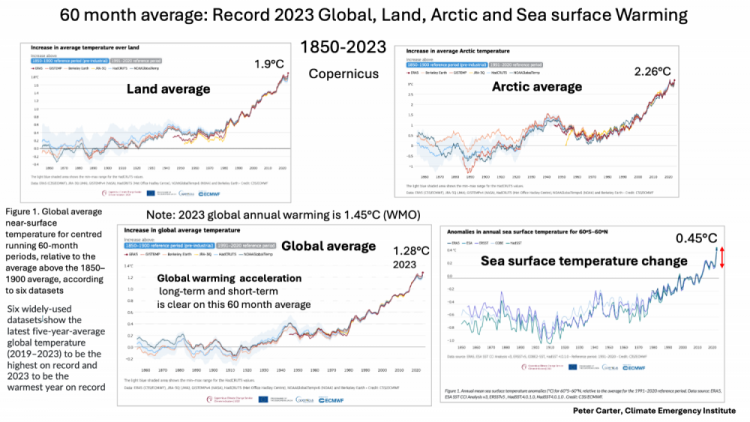
Unprecedented rate of atmospheric CO2 increase
drives accelerating increase
of global warming
drives accelerating increase
of global warming
Summer warming
matters most
matters most
Summer Warming
Global warming does not provide what we most need to know- that is summer temperature increases over land
Global warming does not provide what we most need to know- that is summer temperature increases over land
The NASA maps show warming hotspots
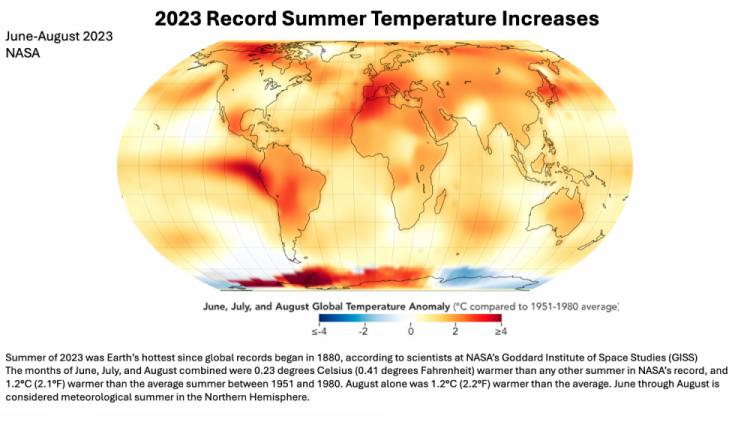

April 2025 was the 21st month ending, a 22-month period for which the global-average surface air temperature was at or above 1.5°C from pre-industrial level.
There is unequivocal evidence that Earth is warming at an unprecedented rate (NASA)
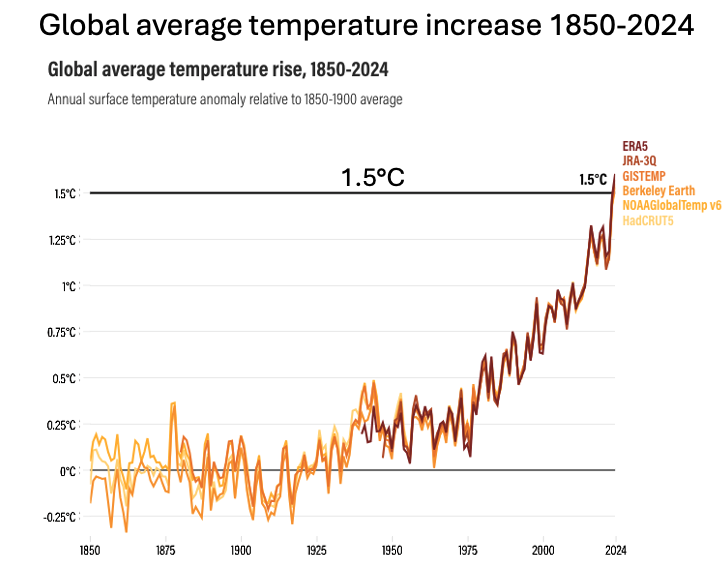
The basic science in a few images
Fossil fuel air pollution contains
acid aerosols that are cooling
Recent global measures to improve air quality have reduced the aerosols, so reduced the cooling
resulting in a relative extra warning.
acid aerosols that are cooling
Recent global measures to improve air quality have reduced the aerosols, so reduced the cooling
resulting in a relative extra warning.
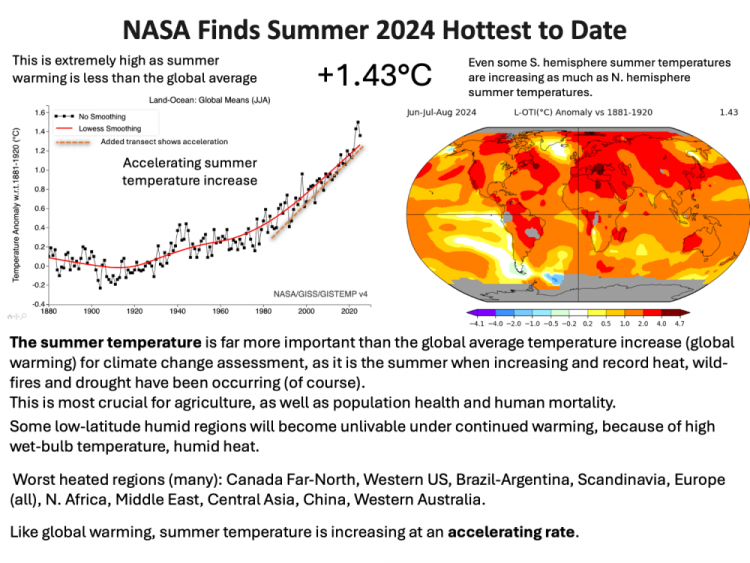
2023 Summer warming was a big record, at the time.
2014 was just higher.
2014 was just higher.
Global warming is accelerating, at an unprecedented rate (Forster,2025, 2024 indicators)
2023 was a record-warming year, by a huge margin. Global temperature is now the highest in 125,000 years